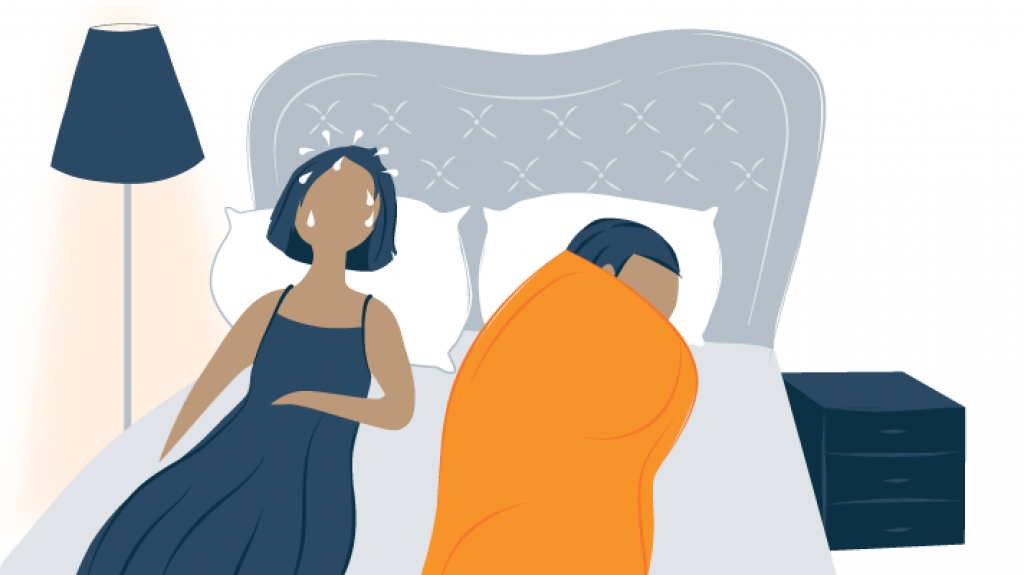It seems like global warming and climate change are constantly being discussed, whether it be in the news, at schools, or just in daily life. But, did you know that climate change can actually affect your quality of sleep at night?
Changes in environmental temperature can affect body temperature, which then impacts the body’s biological clock.
Keep reading to learn more about climate change, how it affects sleep, and how you can combat this challenge to get a good night’s rest. We’ll also provide some suggestions on how you can reduce your carbon footprint and help slow climate change.
What Is Climate Change?
What is the Difference Between Climate and Weather?
Before understanding climate change, it is important to understand the difference between climate and weather.
According to the National Centers for Environmental Information1, weather reflects short-term atmospheric changes in a particular location, while climate reflects long-term weather patterns. For example, while a particular location may be really hot today, that is just the place’s weather. However, if most summer days there are around 90 degrees Fahrenheit, this describes the place’s climate.
Climate Change
National Geographic2 explains that climate change is the “long-term alteration of temperature and typical weather patterns in a place”, and it sometimes occurs in a specific place but could also affect the entire planet. Climate change doesn’t just mean that the temperature in a specific location is changing, but it could also mean that other weather patterns3 such as rainfall have changed.
Climate change occurs when humans burn fossil fuels (gas, oil, coals, etc), and greenhouse gasses are released into the atmosphere, trapping heat from the sun in the atmosphere2. This trapped heat causes temperatures to rise, which is called global warming2. When humans use these natural resources so often, this increases the rate at which climate change and global warming occur.
Recent Trends in Climate Change
Over the past 100 years, the temperature of the earth’s surface has increased by 2 degrees Fahrenheit1. While two degrees may sound minimal, if global warming continues to occur at this rate, the earth will become hotter even faster.
Here are a few visible changes4 we see due to climate change:
- Severe tropical storms because of warmer ocean water
- Polar regions and glaciers melting faster because of warm air
- Sea levels are rising, which is dangerous for marine life and coastal communities
- More extreme droughts because of increased global temperatures
How Climate Change Is Affecting Sleep
The best temperature for sleep is between 60 and 67 degrees5 Fahrenheit for adults. Why is this the ideal temperature, though?
The body’s biological clock, or circadian rhythms, relies on several factors6 to help you fall asleep and stay asleep. Thermoregulation, or the regulation of body temperature, is one of these critical factors.6 When your body is ready to go to sleep, your body temperature drops slightly and stays lower throughout the night, compared to during the day. This lower body temperature helps you achieve a good night’s rest, as it signals your circadian rhythms telling your body that it’s time for bed.6
As the temperature outside increases, though, your body temperature can also increase, confusing your internal body clock. In a 2022 study7, researchers found that when environmental temperature increased during the night, the participants took more time to fall asleep, and slept for less time overall. This delayed time of falling asleep and decreased amount of sleep overall shows the impact that higher temperature has on sleep quality; people were hotter at night, so their sleep cycle was impacted.
Cali Bahrenfuss, Clinical Sleep Health Educator, Registered Sleep Technologist, and founder of Delta Sleep Coaching, explains that “being too warm at night can impact the quality of our sleep, as well as cause unwanted awakenings. When people wake at night because they are too warm, it can take a long period of time to cool back down and initiate sleep.”.Therefore, if the global temperature continues to rise at the current rate, people are expected to sleep less as a result.
Climate Anxiety
Anxiety is characterized by consistent worry and fear8, and climate change is a topic that causes anxiety for many people, a phenomenon often referred to as climate anxiety or eco-anxiety.
Smriti Joshi, Chief Psychologist at mental health app Wysa, explains that “climate anxiety refers to the psychological distress, fear, and worry experienced by individuals due to concerns about the current and future impacts of climate change on the planet, life at the present moment, and the future of generations and humanity.”
So, on top of the actual increase in temperature affecting one’s sleep, someone with eco-anxiety can experience sleep disruptions caused by their anxious feelings surrounding climate change, similar to people with other types of anxiety who have trouble falling and staying asleep.
Learn more about the connection between sleep and anxiety in our in-depth guide on sleep and anxiety.
How to Calm Climate Anxiety
If you experience eco-anxiety, Joshi suggests some steps you can take to reduce symptoms to help you sleep better at night.
- Establish a calming nighttime routine – Create a calming nightly routine for yourself, such as reading a book or meditating. This will hopefully reduce the anxious thoughts that could be racing through your mind.
- Find a support system – With any type of anxiety, it is helpful to be open with your family or friends, so you don’t feel alone in your struggles. You may also want to connect with a therapist or a medical professional regarding your climate anxiety.
- Take action – Use your eco-anxiety as fuel for making a positive impact on the environment. Whether you decrease your own carbon footprint, raise money to help with climate change, or advocate for the planet in other ways, making an actual change may quiet your anxious thoughts.

What is Climate Grief?
Along with climate anxiety, you may also experience climate grief. Joshi explains that climate grief impacts “various aspects of an individual’s life including their biological functions such as appetite, sleep patterns, and quality of sleep”. Similar to grief that occurs when a loved one passes away, climate grief9 is the overwhelming sense of loss that people experience regarding the negative changes that the earth is experiencing.
Similar to climate anxiety, taking action to make a change and speaking with a professional can help calm climate grief, along with spending time in nature.9
How to Get Better Sleep as Temperatures Rise
Now, we’ll discuss some ways you can offset the negative effects of rising temperatures to ensure you’re still getting a good night’s rest.
Bahrenfuss recommends multiple ways to stay cool while sleeping, such as:
- Turning your air conditioning down a few degrees
- Using a fan while sleeping
- Taking a cold shower before bed
- Using blackout curtains to block the sun
- Keeping a damp cloth by your bedside
- Buying cooling or lightweight products such as cooling mattresses, pillows, pillowcases, sheets, blankets, and pajamas
Bahrenfuss also suggests exercising during the day as a way to better your sleep, even if it’s inside because it is too hot outside. Lastly, she encourages you to expose yourself to natural light during the day, even if just through a window; this will help teach your body’s clock when it’s daytime versus nighttime.
Some additional ways you could stay cool at night are:
- Sleeping alone
- Avoiding exercise close to bedtime so your body temperature isn’t already high
- Keeping a cold glass of water by your bedside
The Future of Climate Change and Sleep
As mentioned, climate change is predicted to worse, especially if we don’t make conscious efforts to reduce our own carbon footprints. With more global warming, it will become increasingly difficult to stay cool at night, which can negatively affect our sleep patterns.
Thus, it is all the more important to rely on the suggestions listed above to help keep you cool at night, like using a fan and blackout curtains. Simultaneously, you may need to find ways to navigate your emotions on climate change in order to help you sleep, such as talking with a therapist and prioritizing relaxing nighttime routines.
What You Can Do To Help Climate Change
Climate change and global warming affect many facets of our daily lives, including our quality of sleep. It is important that we try to limit our carbon footprint, thereby reducing greenhouse gas emissions and slowing global warming.
Here are just a few ways you can reduce your carbon footprint10:
- Turn off the lights when you leave a room
- Take shorter showers
- Walk or bike instead of driving
- Use fewer appliances
- Take the stairs instead of an elevator
Along with reducing your carbon footprint, you can donate time and money to organizations that fight against climate change, and you can also educate your friends and family on the importance of reducing their own carbon footprint.
Common Questions About Climate Change and Sleep
Does climate change cause insomnia?
No, climate change does not directly cause insomnia, but higher temperatures will likely make it harder for you to fall asleep and may decrease the number of hours you sleep at night. This is because, for a better night’s rest, body temperature should be cooler.
What is the best environment for sleep?
The best environment for sleep is cool (between 60-67 degrees Fahrenheit), quiet, and dark. You’ll also want a mattress that supports your body weight and sleeping position, along with comfortable bedding.
Your bedroom should not include blue light electronics, which can disrupt your circadian rhythm. A bedroom that lacks clutter and dust is also ideal. Finally, calming scents such as lavender may help you sleep better.
What are the symptoms of climate anxiety?
According to a study conducted in 202111, climate anxiety can lead to a variety of symptoms, like sleeplessness, panic attacks, loss of appetite, irritability, and weakness. You may be able to reduce these symptoms by talking to a therapist or medical professional and taking active steps to reduce your carbon footprint.
Final Thoughts
Climate change can be a difficult and scary topic, especially for those who experience eco-anxiety and climate grief. Combine that with data on how increasing global temperature can negatively affect our sleep, and you might feel even more frustrated. However, the good news is that you can take measures to ensure you sleep well and are able to manage the anxiety that can come with thoughts of climate change.
We hope our suggestions regarding a cooler bedroom and ways to reduce climate anxiety and climate change will provide you with the tools you need to sleep peacefully on our ever-changing globe.

Emma Cronan
Writer
About Author
Emma is an Editorial Intern for Sleep Advisor. She collaborates with the editor and staff writers to come up with article ideas, create article outlines, and write for the website.
Combination Sleeper
References
- “What’s the Difference Between Weather and Climate?”. National Centers for Environmental Information. Webpage accessed July 23, 2024. https://www.ncei.noaa.gov/news/weather-vs-climate#:~:text=Whereas%20weather%20refers%20to%20short,regions%20can%20have%20different%20climates.
- “Climate Change”. National Geographic. Last modified May 20, 2022. https://education.nationalgeographic.org/resource/climate-change/.
- “What is Climate Change?”. NASA Climate Kids. Webpage accessed July 20, 2024. https://climatekids.nasa.gov/climate-change-meaning/.
- “What are some of the signs of climate change?”. United States Geological Survey. Webpage accessed July 20, 2024. https://www.usgs.gov/faqs/what-are-some-signs-climate-change#:~:text=Tropical%20storms%20becoming%20more%20severe%20due%20to%20warmer%20ocean%20water%20temperatures.&text=As%20temperatures%20rise%20there%20is,and%20the%20snow%20melts%20faster.&text=Overall%2C%20glaciers%20are%20melting%20at%20a%20faster%20rate.
- “What’s the Best Temperature for Sleep?”. Cleveland Clinic. https://health.clevelandclinic.org/what-is-the-ideal-sleeping-temperature-for-my-bedroom/. 2021.
- Obradovich, Nick., Migliorini, Robyn., et. al., “Nighttime temperature and human sleep loss in a changing climate” Science Advances. https://www.science.org/doi/10.1126/sciadv.1601555/. 2017.
- Minor, Kelton., Bjerre-Nielsen, Andreas., et. al., “Rising temperatures erode human sleep globally”. Science Direct. https://www.sciencedirect.com/science/article/pii/S2590332222002093. 2022.
- “Anxiety Disorders”. Mayo Clinic. Last modified May 4, 2018. https://www.mayoclinic.org/diseases-conditions/anxiety/symptoms-causes/syc-20350961.
- Allen, Summer. “Is climate grief something new?”. American Psychological Association. https://www.apa.org/members/content/climate-grief. 2020.
- “Simple Tips to Reduce Your Carbon Footprint”. Sustainability at Georgetown University. Webpage accessed July 20, 2024. https://sustainability.georgetown.edu/community-engagement/things-you-can-do/.
- Dodds, Joseph. “The Psychology of Climate Anxiety”. National Library of Medicine. https://www.ncbi.nlm.nih.gov/pmc/articles/PMC8499625/#:~:text=Climate%20anxiety%20can%20lead%20to,whether%20they%20themselves%20feel%20too. 2021.
